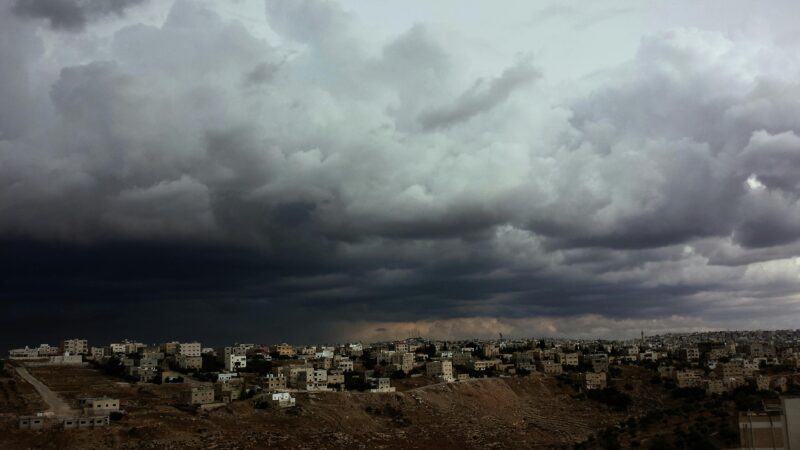By Stijn Aelbers, Senior Humanitarian Advisor, Internews
“Can you believe this weather? It’s been so unpredictable lately.”
“Looks like we’re finally getting a break from the rain/snow.”
“I heard it’s going to warm up later this week. About time!”
– Opening lines about the weather to spark a conversation, as suggested by an AI platform
For years we have been taught that we need to understand the difference between weather and climate. Just because it’s snowing in April, it doesn’t mean that the planet isn’t heating up. To understand climate change, you need to look at the long-term trends, which are based on big data sets. This is where the infamous 1.5°C benchmark – research found that limiting global warming to 1.5°C will reduce the impacts on human systems – comes from, as do maps of areas that would or could be flooded by 2030, if we didn’t do something to avert this.
When the challenges are global, it’s important to have global data and have global conversations on global platforms, through global collaborations and organise global conferences, like the United Nations Climate Change Conference, or COP, assess progress made on climate change.
But in the meantime, today, there are people in frontline communities wondering whether they should stay and change crops or move elsewhere, hoping for a better future. Or, as a buffalo farmer in Babylon, Iraq put it: “We are afraid of time; we don’t know what is coming for us. For those of us who can’t read and write it’s all through word of mouth – we can’t read on the news, they speak in difficult formal language that we can’t understand.” – (From the Internews-State up-report “Silent Crisis“)
There is a big gap between local realities and global conversations, between individuals trying to survive today and people looking for ways to address the planetary disasters looming on the horizon. And that gap is being filled by political strategies to undermine climate change commitments, sowing questions and doubts within communities about the validity of what the issues are and how they could be addressed.
“I don’t really understand why, they’re not giving us our water, it’s all politics. No one has come to explain anything to us. Politicians and NGOs come and look and take pictures, but nothing ever happens. We don’t have any information, we just improvise. We can’t change much, it’s as it was 50 years ago. We don’t expect much, even if they come, we know their ability is limited.” – Fruit farmer, Al Seeba Village, June 2023 (From the Internews-State Up-report “Silent Crisis“)
And it’s not just in low literacy or low connectivity environments that the impact is felt – everyone who has ever taken a plane to attend a climate change conference is by now familiar with the concept of “flight-shaming”. The tension between individual and collective responsibility is fertile ground for political and opinionated debates, too often resulting in feeling powerless or experiencing effort-fatigue, because: what difference does it make?
Focusing on long term, big data sets, is vital for people working on a global level. The challenges posed by climate change don’t stop at the border and will require big and bold action. But people don’t deal with climate and don’t necessarily get up in the morning wondering how they can save the planet – they might just look for a way to get through the day and keep their loved ones safe.
“The weather in Basra affects everyone, and my son specifically. Even when I take my son to the doctor, I see many similar cases. Just said avoid exposure to dust, try to keep him indoors. My niece who lives at my house is the same age and has the same problem.” – Mother of 7-year-old child in Basra with breathing difficulties, June 2023 – (From the Internews-State Up-report “Silent Crisis“)
And it’s not just about turning complicated, long-term data into simpler language. Because the challenges might be global, people’s realities are local and the decisions they need to take are always personal. If we want to support people who are most affected by climate change, we need to start by involving them to understand their dilemmas, connect these with decision-makers who can help with local solutions, informed by global expertise.
It’s time to bridge the gap between these local realities and the global expertise, to support people who are faced with real challenges today. Civil society, including local media, local government and those agencies working on anticipatory action, but also the international agencies who work in the frontline communities should prioritise community engagement, building on existing expertise, understanding local realities and the concerns and preferences that should inform decisions going forward.
In a rapid-changing world, with evolving insights and heightened levels of emergency, these consultations can’t be seen as a one-off exercise, but should be designed as a continuous conversation, providing ongoing updates, ensuring transparency in decision-making to allow for constant reflection and scrutiny and ensure transparency as a vital condition not to lose trust in the process. We cannot risk alienating communities most at risk by appearing coercive. Trust is essential when working together to build strong and resilient communities.
So, it really should start by listening to the people who are most affected by climate change. And as everyone knows: the weather is always a good topic to start a conversation.
